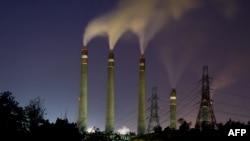Indonesia slashed carbon emissions targets for its power sector by 2030 and pledged to boost the share of renewable energy in a roadmap it released on Wednesday as it seeks to wean itself off coal.
Southeast Asia's largest economy is attempting to reach net-zero power sector emissions by 2050 in return for financing for the $20 billion Just Energy Transition Partnership (JETP) plan.
Under the plan, Jakarta has pledged to slash its power sector carbon emissions to a peak of 250 million metric tons by 2030, down from a previous cap of 290 million.
It also plans to boost its renewable energy generation share to 44 percent by 2030, up from an initial target of 34 percent, the planning document released on Wednesday said.
The billion-dollar public and private financing for the plan, released last year, follows a model first trialed in South Africa and then announced for Vietnam and Senegal, with rich countries pledging funds for the developing world's energy transition.
Jakarta is reportedly unhappy about the JETP deal's proposed mix of financing, worried it will be offered mostly market-rate loans that saddle it with debt.
But it laid out more ambitious targets in the document, titled the Comprehensive Investment and Policy Plan (CIPP), noting that it was not binding.
"The CIPP is a living document, which means that this... will be updated on an annual basis," Edo Mahendra, head of the JETP Indonesia secretariat, said in a statement.
It was published for public consultation, with a final document to be sent out before the COP28 climate summit in the United Arab Emirates that begins later this month.
The United States, Japan, Canada and six European nations signed the deal with Indonesia — one of the world's top coal exporters and coal power generators — to shift it away from its coal reliance.
Jakarta's new figures in Wednesday's document fail to account for a number of new "captive" coal plants, which power factories rather than feeding into the grid.
But the JETP secretariat said Indonesia and the signatory countries "share a strong commitment to identifying and implementing viable solutions going forward."
Indonesia has pledged to stop building new coal-fired power plants but, despite an outcry from activists, it is continuing to build plants that were already planned.
It is also trying to position itself as a key player in the electric vehicle market as the world's largest nickel producer, but some industrial parks that host energy-guzzling nickel smelters are powered by coal.




